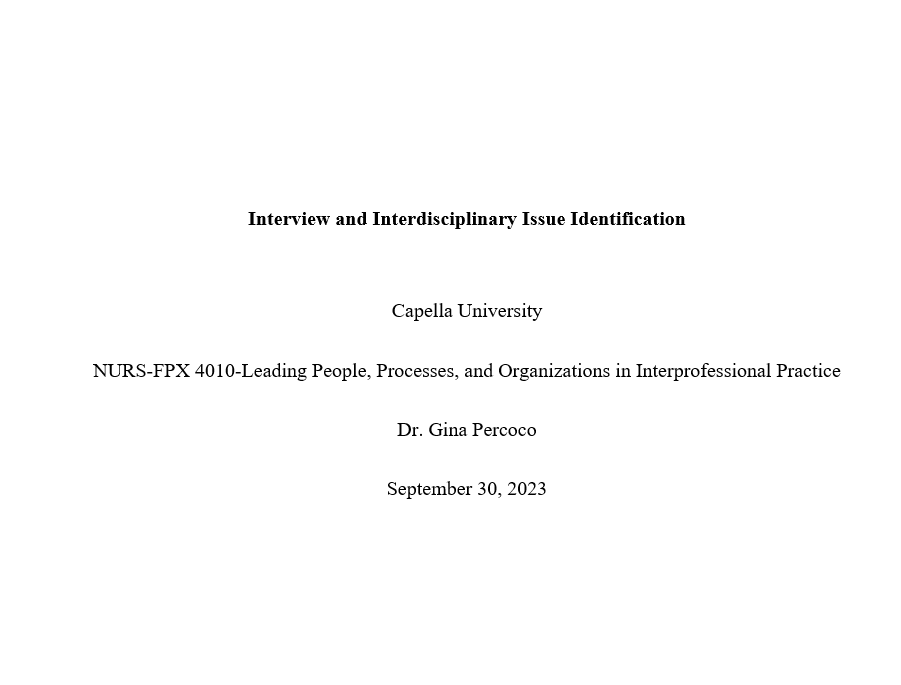NURS-FPX4010_S_Assessment 2-1 solution.docx
Interview and Interdisciplinary Issue Identification
Capella University
NURS-FPX 4010-Leading People, Processes, and Organizations in Interprofessional Practice
Dr. Gina Percoco
September 30, 2023
Interview and Interdisciplinary Issue Identification
Hi everyone. Thank you for participating in this session. I will address the need for interdisciplinary collaboration in promoting safe medication administration. The practice creates opportunities for different healthcare professionals to share knowledge, skills, and experiences on medication errors interception across the care continuum.
The presentation focuses on palliative care setting, which is among the environments that require healthcare professionals to pay close attention to patient demands. Collective commitment makes the care team aware of risks such as inaccurate and incomplete information flow, distractions, and poor oversight associated with medication errors.
Issue
Medication errors are most prevalent concerns in palliative care. Wrong drug administration exposes patients to co-morbidities and premature deaths, which reduce consumer confidence and trust in the care team. The various causes of medication errors include inadequate supervision, inconsistent oversight, and poor communication among professionals (Manias, 2018).
Delayed interventions trigger additional costs associated with lawsuits, readmissions, and prolonged hospitalization. Nurses, physicians, pharmacists, and relevant parties can embrace interdisciplinary collaboration to share knowledge and experiences on strengthening vigilance (Khalil & Lee, 2018).
The intervention also reinforce the need for adequate training and effective communication among professionals to avoid undesirable outcomes.
Change Theory
Lewin’s change model promotes positive behavior as it relates to change management. The first stage is unfreezing, which makes the care team aware of the identified problem and strategies necessary to strengthen the driving forces behind safe medication administration (Gupta et al., 2017).
The outcomes align with the workforce’s increased awareness of the list of driving forces that improve the quality and safety of medications.
Nurses, physicians, and pharmacists will respond to calls for accurate and complete verifications, streamlined information flow, and effective oversight, and minimal distraction necessary to optimize medication administration processes. Members of the care team maintain open communication with colleagues to shared evidence on identifying and intercepting errors.
Leadership Strategies
Leaders influence the quality of interdisciplinary collaboration. The ability to initiate and sustain team-based functions allow leaders to reduce medication errors across the care continuum. The transformational approach inspires a shared vision, where everyone understands the importance of safe medication administration and the strategies for protecting patients from adverse drug reactions (Manias, 2018).
The leaders model effective communication, behaviors, and attitudes necessary to enhance accuracy during medication preparation and administration. The right leaders also encourage horizontal communication characterized by shared interdisciplinary governance to enhance collective commitment to optimizing care outcomes.
Interdisciplinary Collaboration to Reduce Medication Errors
Interdisciplinary collaboration in palliative care helps create a culture of shared governance. The goal is to create a conducive environment where everyone focuses on improving quality and safety of patient care through open, honest, and effective communication.
The concept also allows leaders to initiate distributive power that empowers different professionals to share knowledge, skills, and experiences on evidence-based strategies for improving medication administration safety. Nurses, physicians, pharmacists, clinical assistants, and relevant affiliates develop conversations on risks and interventions necessary to identify and intercept medication errors.
References
Gupta, D., Boland, R., & Aron, D. (2017). The physician’s experience of changing clinical practice: A struggle to unlearn. Implementation Science, 12(28), 1-10. https://implementationscience.biomedcentral.com/articles/10.1186/s13012-017-0555-2
Khalil, H & Lee, S. (2018). The implementation of a successful medication safety program in a primary care. Journal of Evaluation in Clinical Practice, 24(5), 1-5. https://onlinelibrary.wiley.com/doi/abs/10.1111/jep.12870
Manias, E. (2018). Effects of interdisciplinary collaboration in hospitals on medication errors: An integrative review. Expert Opinion on Drug Safety, 17(3), 259-275. https://pubmed.ncbi.nlm.nih.gov/29303376/
Varagona, L., Nandan, M., Hooks, D., Porter, K. J., Maguire, M. B., Slater-Moody, J. (2017). A model to guide the evolution of a multi-professional group into an interprofessional team. The Journal of Faculty Development, 31(2), 49-56. https://eric.ed.gov/?id=EJ1142348



